Astellas Pharma gets US-FDA nod for Cresemba to treat invasive aspergillosis & invasive mucormycosis in paediatric patients
Astellas Pharma US, Inc. announced that the US Food and Drug Administration (FDA) has approved Cresemba (isavuconazonium sulfate), an azole antifungal drug, for the treatment of invasive aspergillosis (IA) and invasive mucormycosis (IM) in paediatric patients.
Cresemba for injection is approved for adults and now for paediatric patients 1 year of age and older. Cresemba capsules are approved for adults and now for paediatric patients 6 years of age and older who weigh 16 kilograms (kg) and greater. With this approval, Cresemba is now the only azole antifungal therapy approved for the treatment of IA and IM in patients as young as one.
"Invasive fungal infections are a significant concern to healthcare professionals who care for paediatric, adolescents and young adults with hematologic malignancies, transplant recipients and primary immune deficiencies," said Antonio C. Arrieta, M.D., medical director, Paediatric Infectious Disease, Children's Health of Orange County. "IA, currently the most common invasive mold infection in these patients, and IM are associated with significant morbidity and high fatality rates. The FDA approval of Cresemba for paediatric patients adds a much-needed treatment option."
"The recent Covid-19 pandemic drove an uptick in these serious and life-threatening fungal infections, presenting an even greater urgency to address this growing unmet medical need," said Lynn Fenicchia, senior vice president and Head of US Medical Specialties Business Unit, Astellas. "Patients are waiting, and we know that young IA and IM patients are most at risk. Today's approval will bring hope to this highly vulnerable patient population with limited treatment options."
The approval is based on results from two paediatric clinical studies, including a phase 2 open-label, non-comparative, multicenter study (NCT03816176) evaluating the safety, efficacy and pharmacokinetics of Cresemba for the treatment of IA or IM in paediatric patients aged 1 to 17 years old. In the study, 31 patients aged 1 to 17 with possible, probable or proven IA or IM were treated with Cresemba (10 mg/kg) every 8 hours on days 1 and 2, and once-daily thereafter for =84 days for IA or =180 days for IM. Median treatment duration was 55 days. All-cause case fatality through Day 42 was 6.5% and through day 84 was 9.7% which occurred during the follow-up period and none were considered treatment-related. Successful response rates were 54.8% at the end of treatment. Treatment emergent adverse events (TEAEs) occurred in 93.5% of patients and 29.0% patients experienced drug-related TEAEs. Treatment was withdrawn in two patients due to TEAEs. Serious TEAEs occurred in 58.1% of patients and were assessed as drug-related by the investigator in one patient. These data were presented as an oral abstract presentation during IDWeek 2023 on October 13th and a session during Trends in Medical Mycology (TIMM) 2023 on October 22nd.
In addition, the FDA granted paediatric exclusivity for Cresemba, which extends the period of market exclusivity for Cresemba in the United States by an additional six months.
Invasive aspergillosis can be a life-threatening fungal infection that is seen predominantly in immunocompromised patients, such as patients with leukemia. Invasive mucormycosis is a rare and often life-threatening fungal infection. IA and IM are a major cause of morbidity and death among immunocompromised and hospitalized paediatric patients.
Cresemba (isavuconazonium sulfate) is an azole antifungal indicated for the treatment of invasive aspergillosis and invasive mucormycosis as follows:
Cresemba for injection: adults and pediatric patients 1 year of age and older.
Cresemba capsules: adults and paediatric patients 6 years of age and older who weigh 16 kg and greater.
Specimens for fungal culture and other relevant laboratory studies (including histopathology) to isolate and identify causative organism(s) should be obtained prior to initiating antifungal therapy. Therapy may be instituted before the results of the cultures and other laboratory studies are known. However, once these results become available, antifungal therapy should be adjusted accordingly.
Astellas Pharma US, Inc. is a US affiliate of Tokyo-based Astellas Pharma Inc., a pharmaceutical company conducting business in more than 70 countries around the world. Astellas stands on the forefront of healthcare change to turn innovative science into value for patients.

Optimize Your trial insights with Clival Database.
Are you exhausted from the uncertainty of trial insights pricing? Clival Database ensures the clarity in the midst of the global scenario for clinical trials to you.Clival Database is one of the best databases that offers an outstanding number of clinical trial data in terms of 50,000+ molecules and from primary regulatory markets as well as new entrants like Indian and Chinese markets.
With Clival, you get accurate positioning of historical sales data, patent database, company profiling, safety & efficacy, and prediction of launch of new innovative molecules helping you to align your research and driving down the cost.
To add value, we further break down our analytics for you so that improving your operational effectiveness; optimizing your clinical trials; and offering you accurate and high-quality data at lowest possible prices becomes possible.
Elevate your trial success rate with the cutting-edge insights from Clival database.
Check it out today and make more informed sourcing decisions! Learn More!







